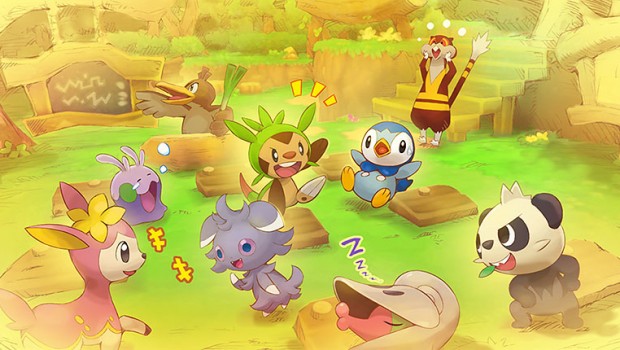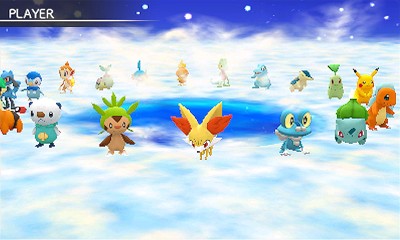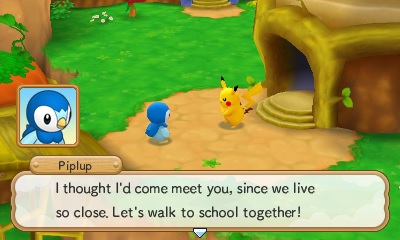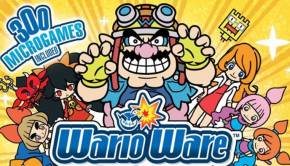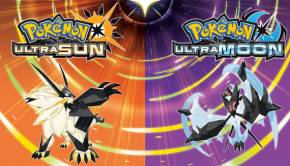Pokémon Super Mystery Dungeon 3DS Review
Summary: Pokémon Super Mystery Dungeon has good lessons to learn, but chief among them might be persistence: dungeon crawling is tiresome.
3
Good Vibes
Whenever the notion that ‘Pokémon is for kids’ comes up, my counter argument has always referenced min-maxing and IV training; becoming a Pokémon master in the real world is weighted towards those old enough and dedicated enough to master the hidden depths, rather than being a ten-year-old’s cakewalk.
But Pokémon Super Mystery Dungeon commits to the younger audience quite fiercely: the opening questionnaire, which determines which Pokémon the player becomes, repeatedly references school; when arriving in the Pokémon world, the player is constantly told they look like a child and is then enrolled in school; and when trying to join the Expedition Society, the player and their partner Pokémon are only inducted as junior members.
This was, initially, jarring for me. I wanted to protest: ‘hey, I’m no kid! I’ve been around the way, fought my fair share of battles, taken plenty of gym badges, and—on occasion—walloped the Elite Four.’ But then I stopped being a grouchy adult and realised that my initial approach was the very same one that leads others into pointless and incorrect arguments like ‘Pokémon is for kids.’
Pokémon is about children—human or Pokémon—but the cutesy design does not diminish the fact that it can tackle some serious issues in ways that can be understood and appreciated by children and adults. Pokémon Super Mystery Dungeon is no different in this respect; large portions deal with school yard bullying, of both the intentional and unintentional varieties, and the player’s partner exhibits behaviour that seems symptomatic of autism.
That the player and the partner Pokémon become a team—in spite of the fact that the partner is a social outcast who occasionally, unwittingly, does and says inappropriate things—is an incredibly positive message and one that should be wholeheartedly embraced. Being weird or different is no excuse to pull a Shelmet or Pancham and play horrible ‘pranks’; let’s be friends and have adventures together, instead.
These adventures consist of exploring dungeons to achieve a number of tasks, but essentially boil down to ‘reach the end’, ‘defeat this Pokémon’, or ‘find this object/Pokémon’. This simple approach is supplemented by consistent rewards—level up, find some items, improve a move. The drip-feeding of incentives was a key motivator; it kept me exploring beyond the point where my enthusiasm started to wane.
After a while—particularly once you have to return to dungeons—the initial excitement that comes with being a Pokémon, cruising around, collecting loot, and battling other Pokémon does wear off. A large part of this stems from the fact that the titular mystery—amnesia, becoming a Pokémon, being attacked by Beheeyem—takes a backseat.
The Beheeyem are casually dropped into conversation occasionally in an attempt to remind the player that there is a larger purpose here, but when combined with the fact that a) being a Pokémon and hanging out with your partner is already more interesting a narrative and b) dungeon exploring is repetitive and quickly stops being compelling, the apparent driving force of the game just falls flat.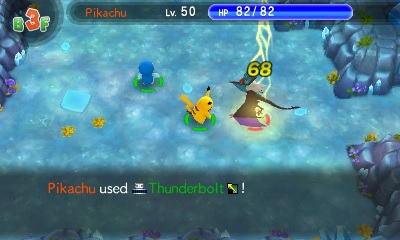
After being inducted into the Expedition Society, the player is given a Connection Orb. By meeting and assisting other Pokémon, an elaborate web of connections begins to form—presumably, near every current Pokémon features within this web. So if the dungeoneering aspect appeals in a way that it doesn’t for me, or if there’s an unmanageable compulsion to be the very best Pokémon like no-one ever was, then there is an absolute dearth of new friends and allies to make and bring with you into subsequent dungeons for fun and profit.
Unfortunately, it didn’t click for me. But it’s not because Pokémon is for kids; Pokémon is for everybody.
Game Details
Developer: Spike Chunsoft
Publisher: The Pokémon Company
Genre: Roguelike
Platform(s): Nintendo 3DS
Rating: G

